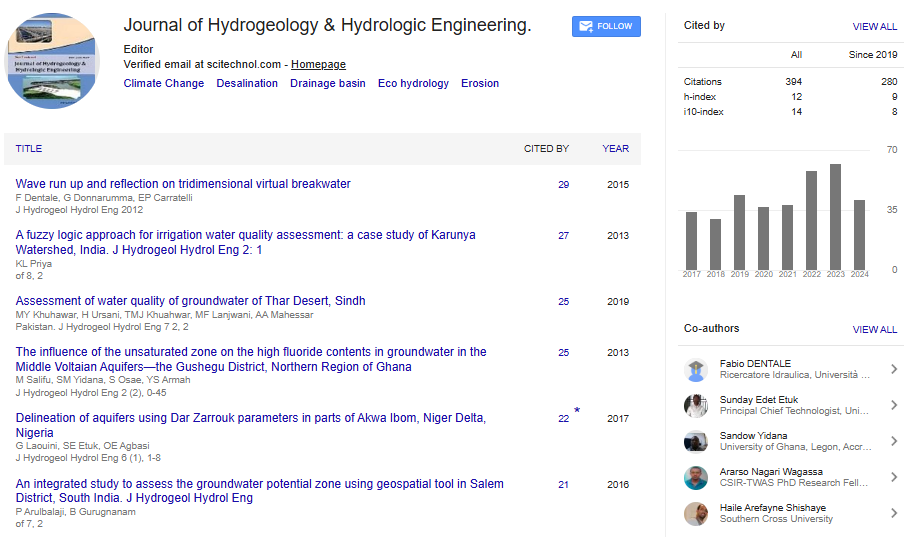Commentary, J Hydrogeol Hydrol Eng Vol: 12 Issue: 3
The Fusion of Artistic Expression and Scientific Inquiry in Hydrometeorology
Raphael Quast*
Department of Civil Engineering, University of Kuwait, Kuwait City, Kuwait
*Corresponding Author: Raphael Quast
Department of Civil Engineering
University of Kuwait, Kuwait City
Kuwait
E-mail: quastr77@gmail.com
Received date: 15 May, 2023, Manuscript No. JHHE-23-107509;
Editor assigned date: 17 May, 2023, PreQC No. JHHE-23-107509 (PQ);
Reviewed date: 31 May, 2023, QC No. JHHE-23-107509;
Revised date: 08 June, 2023, Manuscript No. JHHE-23-107509 (R);
Published date: 16 June, 2023, DOI: 10.4172/2325-9647.1000270
Citation: Quast R (2023) The Fusion of Artistic Expression and Scientific Inquiry in Hydrometeorology. J Hydrogeol Hydrol Eng 12:3.
Description
Hydrometeorology, often referred to as hydroclimatology, is an interdisciplinary field that blends the realms of meteorology, hydrology, and climatology. It focuses on understanding the complex interactions between the Earth's atmosphere and its water cycle, encompassing processes such as precipitation, evaporation, surface runoff, and groundwater flow. Hydrometeorologists play a vital role in deciphering weather patterns, studying hydrological systems, and addressing the challenges posed by extreme weather events and water resource management. This article delves into the fascinating world of hydrometeorology and its importance in our lives.
Hydrometeorology plays a pivotal role in our understanding of the Earth's water cycle and its influence on the environment. By studying atmospheric processes, including air masses, humidity, and cloud formation, hydrometeorologists can predict and analyze precipitation patterns, which are essential for various sectors, such as agriculture, water supply, and flood management. Additionally, the field helps us comprehend climate change impacts on hydrological cycles, contributing vital information for mitigation and adaptation strategies.
At the heart of hydrometeorology lies the interconnectedness between weather and water. Weather patterns directly impact the distribution of precipitation, snowmelt rates, and even the potential for severe weather events like hurricanes, cyclones, and thunderstorms. Understanding these linkages is essential for forecasting extreme events and developing early warning systems, thus safeguarding communities from the adverse effects of natural disasters.
To unravel the mysteries of the water cycle and its interactions with the atmosphere, the collection of accurate and extensive data is paramount. Advanced weather monitoring technologies, such as weather radars, satellites, and weather stations, provide real-time data on precipitation, temperature, humidity, wind patterns, and other meteorological parameters. Coupled with ground-based hydrological measurements, this information enhances our ability to create comprehensive models and simulations to predict floods, droughts, and other hydrological phenomena.
Hydrometeorologists employ sophisticated numerical models to simulate and forecast weather and hydrological conditions. These models integrate atmospheric and hydrological data to predict rainfall patterns, river flows, and groundwater levels. By analysing the results, decision-makers can make informed choices concerning water resource management, flood preparedness, and irrigation planning, ultimately minimizing potential risks and maximizing water usage efficiency.
As the world faces the challenges of climate change, hydrometeorology becomes increasingly relevant. Changes in global temperatures influence precipitation patterns, evaporation rates, and the frequency of extreme weather events. By studying past climatic trends and analyzing current data, hydrometeorologists contribute significantly to climate change research, helping societies adapt to the evolving environmental conditions.
Despite its essential importance, hydrometeorology faces challenges, including the need for more extensive and accurate data, the integration of advanced technology, and the improvement of modeling techniques. Additionally, the impacts of climate change pose uncertainties that require constant adaptation and innovation in the field. Future developments in hydrometeorology may include improved weather forecasting models, better climate change projections, and enhanced early warning systems.
Conclusion
Hydrometeorology stands at the intersection of meteorology, hydrology, and climatology, shedding light on the intricate relationship between weather and water. Its role in predicting extreme weather events, managing water resources, and addressing the challenges of climate change makes it a vital field of study. With on-going advancements in technology and the dedication of researchers, hydrometeorology continues to be an essential tool in shaping a more sustainable and resilient future.
 Spanish
Spanish  Chinese
Chinese  Russian
Russian  German
German  French
French  Japanese
Japanese  Portuguese
Portuguese  Hindi
Hindi 
